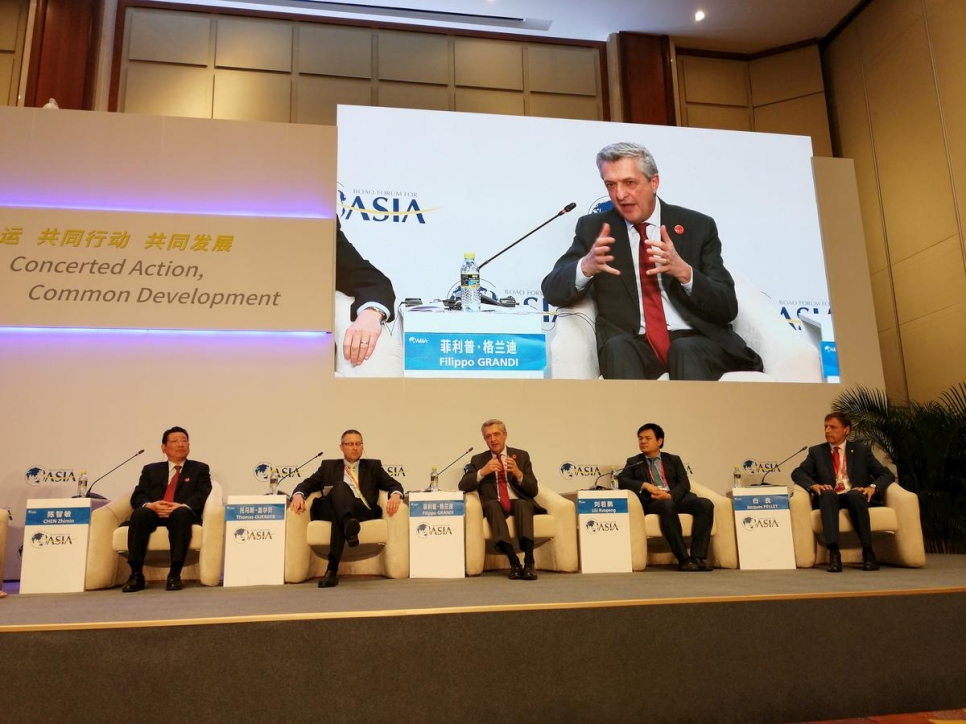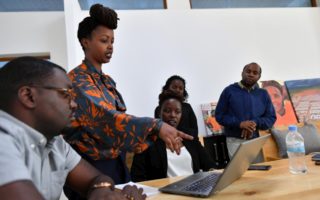
UN High Commissioner for Refugees Filippo Grandi addresses a panel at the Boao Forum for Asia, Boao, China. © UNHCR/ Peter Yang
As part of UNHCR’s growing engagement with China, High Commissioner Filippo Grandi calls on the private sector to collaborate on connectivity and innovation for refugees.
BOAO, China – Connectivity is the foundation of security, said UN High Commissioner for Refugees Filippo Grandi as he urged business and technology leaders in China to collaborate on solutions for refugees and displaced people around the world.
During his first visit to the Boao Forum for Asia in southern China this week, Grandi made the link between security, forced displacement and humanitarian crises in front of an audience consisting of presidents and chief executive officers of Chinese conglomerates. They were attending the high-level annual dialogue in Hainan province that has been compared to the World Economic Forum in Davos, Switzerland.
“Refugees escape from insecurity, and sometimes their own massive movements can be a cause of further instability,” said the High Commissioner. “In this globalised world, a war in Africa has consequences here as well. That’s why we’re advocating for countries like China to help with addressing the root causes of forced displacement and dealing with its consequences.”
Technology has a critical role to play, he said, recalling an exchange he had with a Syrian refugee in Greece. The man had fled bombs in his hometown, travelled through war-torn areas and survived the perilous voyage to Europe. When asked at what point he felt his life was most in danger, he said: “When I was on a boat at sea and all of a sudden my phone had no connection anymore.”
“Being connected today is a fundamental element of security.”
“It shows that being connected today is a fundamental element of security. That is why the Belt and Road Initiative is so remarkable,” said Grandi, referring to the central role of connectivity in the Chinese initiative.
He added: “As you know, the motto of the Sustainable Development Goals is to ‘leave no one behind.’ No one should be left behind in terms of connectivity as well. If you have people who cannot participate in the advantages of globalisation, you create dangerous pockets of underdevelopment which will be more prone to insecurity. That is why I think the investments in technology to ensure that connectivity benefits all are a forward-looking act that China is leading and I hope other countries will follow.”
While at the forum, the High Commissioner met with prominent companies at the forefront of technology and innovation including Baidu, Tencent and China UnionPay. They discussed potential areas of collaboration ranging from awareness raising to resource mobilisation, and technology linked to identification and documentation.
“As the Chinese economy grows, more and more Chinese companies are increasingly willing to assume their global corporate social responsibilities,” said a Vice Chairman of the China Enterprise Confederation, which promotes responsible business practices among Chinese companies.
“We have the technology, experience and the heart to work with UNHCR,” said Gordon Xie, the General Manager of Media Marketing at internet-based technology and cultural enterprise Tencent. “And Chinese consumers are getting increasingly sophisticated, they want to do something for common humanity.”
Guided by the Global Compact on Refugees, UNHCR is expanding partnerships with development actors and the private sector. Affirmed by the UN General Assembly last year, the compact aims to share responsibility more equitably in addressing the challenges of global forced displacement.
Originally published by UNHCR on 29 March 2019





